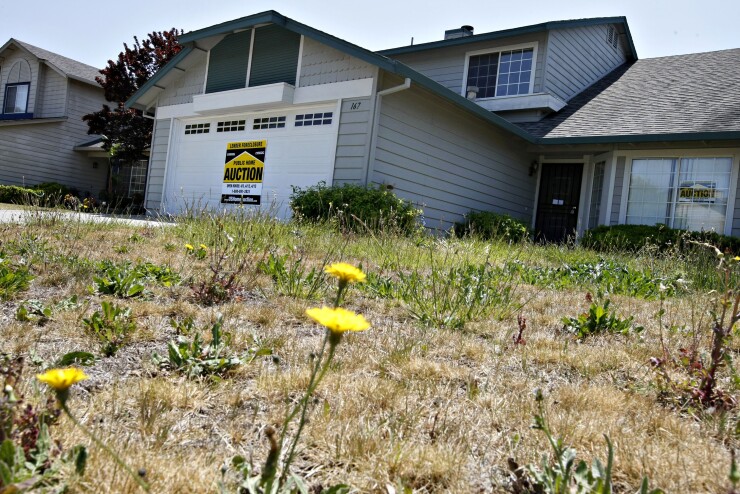Whether they take photos, change locks or serve legal documents, mortgage inspectors and other field personnel need to plan for unexpected and dangerous situations on the job.
The nature of the work means personal security can't be compromised.
"I've been in this game for a while now, and I totally agree that safety is No. 1 priority," said Jaylana Hinson, a commercial and former residential field inspector, whose experience includes field work in Connecticut, Georgia and Florida.
"In mortgage segments, just based on my experience, I know it can be dangerous out there, and this was years ago. I can just imagine what it looks like now," continued Hinson, who estimated that she might have visited several dozen properties on any given day during the height of the Great Financial Crisis.
Even though they are aware that assignments can be fraught with different types of challenges, many like Hinson were left particularly shaken after the mid October incident in Northern Virginia that led to the shooting and death of one of their peers. Contractor Michael Dodge had been assigned to change locks on what was supposedly a
The event highlighted the type of risks field workers face on their rounds, throwing the difficulties of encounters into the spotlight.
"My contractors — I had one actually held at gunpoint and all of their equipment stolen from them a couple years ago," said Talia Ramirez, president of
It's why the businesses like Spectrum place safety first, Ramirez continued.
"One thing about us and a lot of our competitors is we will never take a job where we're being forced to put our contractor in harm's way. We always tell our contractors, 'If you approach your property and it doesn't feel safe, don't approach it. Drive away.' We never want something to happen to them."
Often, as was the case in Northern Virginia incident per news reports, the potential threats don't come from homeowners themselves, especially in situations where vacant units are involved.
"We never know what we're walking into," Hinson said. "I've run into situations where the home was not secured. I've run into situations where the home appears to be secured — the door's locked, bars on windows. I go inside and there are squatters."
About the mortgage field services employee
Mortgage field services personnel consist almost entirely of independent freelance or contract employees who operate in a model that some compare to the gig-work economy. Assignments range from capturing internal or external photos to occupancy checks, preservation work or tasks requiring personal contact, such as legal process servers.
"It's a range of folks that might not have any kind of license, all the way down to Realtors, appraisers, home inspectors," said Luke Tomaszewski, founder and CEO of Proxypics, a real estate technology platform that provides photos to servicers and valuation companies, about his contract employees.
"Some of our clients do request somebody that might have a state credential," he added.
Certain types of contractors, such as legal process servers, may also be mandated to hold licenses per state or local regulations.
While field service companies might have salaried personnel who can perform the occasional inspection or site visit, the reliance on contractors is tied to the unpredictability of the work, where demand varies by season or region. The varied types of assignments makes local knowledge crucial to performing the job well.
"You have to know the local ordinance," Ramirez said. "You want the guys on the ground living in those areas that know the local ordinances, know the laws, know the rules, so we can make sure that we're always following them."
Local inspectors or process servers tend to know the local rules that shape what they can disclose and whether they're allowed to record or document a meeting, and their familiarity with the community helps them recognize when extra vigilance is needed.
During the height of the Great Financial Crisis, many neighborhoods had scores of foreclosed homes. "You'd have to get out to those properties early in the morning, say a 6, 7 a.m. inspection, so you could avoid potential headaches," according to Tomaszewski.
"If the servers know where they're going, they know which parts of town are going to be rough and which parts of town are not," added mortgage industry veteran Bill Newland, who is now vice president, business development, at 360 Legal, a firm providing official document delivery across various industries.
Understanding a community's culture and routines, combined with investigative work, also can help servers get a step ahead of individuals they need to reach.
In a past instance, a contractor was able to serve papers to an individual trying to dodge him by approaching him at church, Newland said.
"Being around a bunch of people — that makes it a little bit safer, because you got a whole lot of people around. Typically, people won't act out at that time," he said.
Whether they occur by plan or chance, interactions between current struggling borrowers and field employees may turn unpleasant, but housing leaders well versed in working with distressed homeowners stress that avoidance and highly charged situations involving the latter group are not typically fueled by outright hostility.
"I think there's a mix of emotions," said Heather Bowman, director of homebuyer education programs at the Idaho Housing and Finance Association, a federally approved housing counseling agency.
"They've gotten their notifications from their servicers but maybe they're scared to talk to them, they're afraid of telling their story."
Helping borrowers
"They want to work with them and see what options are available to help them," Bowman said, referring to servicers. "Really, education is the key to helping homeowners in those situations."
How field staff can best prepare themselves
While local expertise can help them handle or avoid difficult situations, other guidance and training are available to field staff, leaders advise.
Wearing bright colors, name tags or clothing with company logos on them can add a look of professionalism that would lead residents or onlookers to believe that "you're not someone that's just randomly breaking into a home," Ramirez said.
At Proxypics, contractors who perform interior inspection assignments are required to complete internal training, Tomaszewski said. The trade group National Asset Management and Field Services also makes safety training videos available to its members.
"If I go in the field, I never go alone," Ramirez added. "We highly encourage our contractors to have someone else with them," she continued, while acknowledging that what is classified as allowable expenses by government agencies and enterprises limits how much companies can pay for personnel.
While working in teams is a good safety precaution, it's not common practice, Hinson said.
"Some people are taking their partner with them because they want to be safe, but for the most part, from my experience, most people are doing it solo," Hinson added.
She emphasized, though, that those working alone should always keep others informed of their location, which can become difficult when trying to complete several assignments in a day. Some legal process servers go as far to use GPS-location trackers that show where they are visiting according to Newland.
"People should always know where you are," Hinson said.
The different challenges of urban and rural field work
Distressed properties have no boundaries, which also can add wrinkles to the work being conducted, simply based on a home's location, industry leaders advise.
Neighborhoods in cities with a high number of foreclosed properties may have been struggling to begin with, and the flight of residents only exacerbates safety and crime concerns.
"We would have instances where you'd request a police escort in some neighborhoods to actually get into the house," Tomaszewski said.
Meanwhile, rural work often requires long drives to remote properties where the nearest neighbor could be miles away, highlighting some of the perils of solo inspections.
"There was a long driveway, and I get to the house that was supposed to be vacant," Hinson described a past rural property visit. "I get to the house and there's a pitbull inside, and somebody was in the house. And I was by myself"
At that point, Hinson elected to promptly leave the scene.
"What we run into a lot in rural areas is plotline issues where you have to go through the neighbor's road to get to the house behind it," she said. While the neighbor might have been fine with the former resident crossing through, "now some random person going to do a lock change and preservation work — they don't want them driving through."
Regardless of where a supposedly empty property might be found or its condition, employee safety should be a priority for any business that asks an individual to enter the space, no matter what type of company they work for, Ramirez emphasized.
The range of people requiring access could range from utility company employees, cleaners to real estate agents.
"Anyone going into a property — they've just been sent to an address. You're putting yourself in harm's way," Ramirez said.





